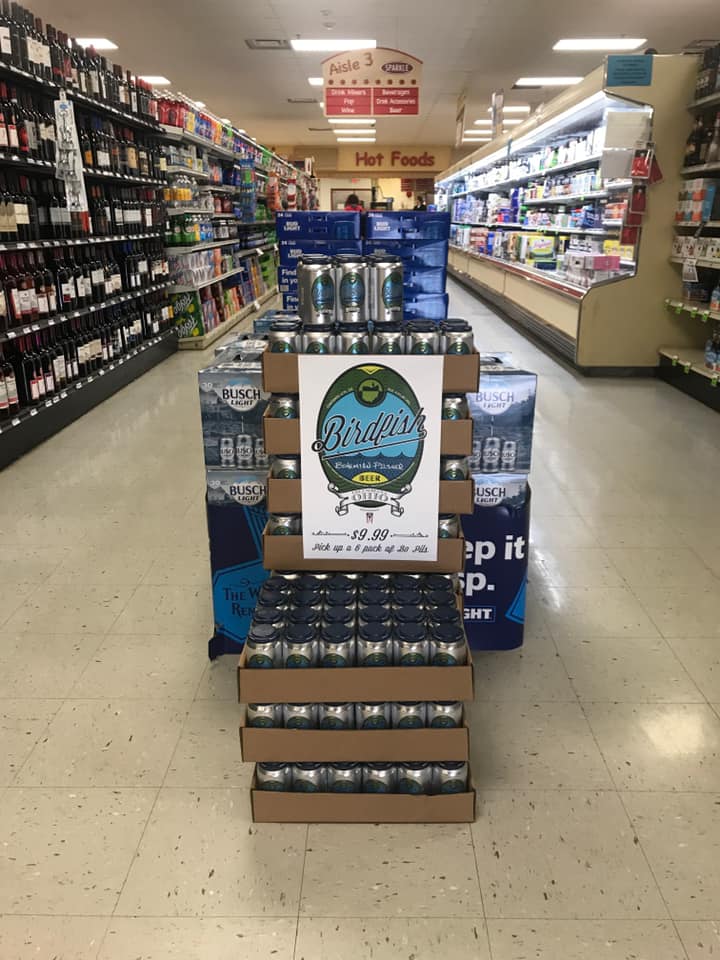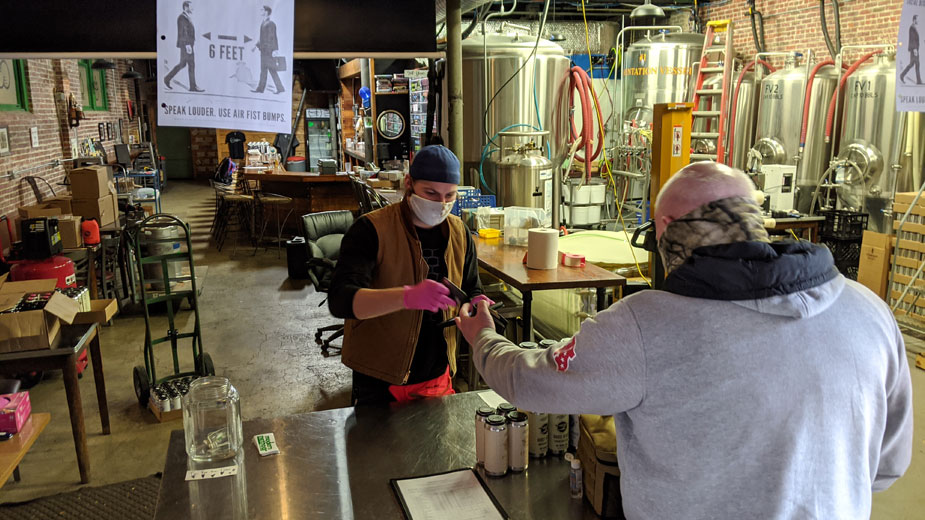YOUNGSTOWN, Ohio — This time a year ago, craft breweries were the toast of the town, bringing in tourism dollars, employing area residents and building from the ground up a new industry rooted in collaboration and local culture.
But, as with many small businesses, the coronavirus pandemic has taken its toll. Stay-at-home orders have closed bars and restricted restaurants to carryout, effectively eliminating the two chief sources of revenue for brewers – in-house taproom consumption and wholesale keg distribution. For many, this has led to dramatic drops in revenue, reduced hours, some layoffs and an urgency to think outside of the box just to keep the lights on.
“Pretty much overnight we lost 95% of our sales pipelines,” says Adam Keck, owner of Modern Methods Brewing Co. in Warren.
The taproom at 125 David Grohl Alley is Modern Methods’ primary source of revenue, whether through customers having a drink on-site or buying cans or growlers of beer for carryout, Keck says. Wholesale revenue is driven primarily by keg sales to bars and restaurants.
Layoffs came the day after Gov. Mike DeWine ordered all bars and restaurants closed to dine-in services, effective 9 p.m. March 15. Between production and taproom employees, Keck laid off seven part-time workers, some of whom worked about 30 hours weekly, he says.
“We decided we’d be better off to get employees in unemployment sooner rather than later,” Keck says. He’s also applied for assistance through the Paycheck Protection Program and the SBA’s Economic Injury Disaster Loan emergency advance program.
Nationally, craft breweries are faring about the same. Data from a survey the Brewers Association conducted found the breweries surveyed laid off or furloughed 66.1% of their 15,190 employees. That breaks down to 82.2% of 6,757 part-time workers and 53.2% of 8,433 full-time workers.
On average, respondents are seeing a 65% drop in onsite sales, with most breweries experiencing drops in excess of 70%, the association reports. Wholesale distribution is down 91% on average, with the median drop in distribution sales at a sobering 100%.
“Everybody in the service industry is fighting to stay alive,” says Brock Beatty, co-owner of Numbers Brewing Co., 127 N Beaver St, Lisbon.
Before the pandemic, wholesale distribution made up half of Numbers’ total revenue. In January 2019, Numbers obtained its license to distribute in West Virginia, where it saw strong demand for its product.
But amid COVID-19, the disease spread by the coronavirus, distribution has been “very limited” to a few customers buying beer for growler fills and six-packs, Beatty says. “You could almost say we’re not doing anything,” he adds.
The drops in revenue forced Numbers to cut eight full- and part-time workers, Beatty says. Community support and carryout, however, have helped to keep the business afloat. Beatty saw a spike in carryout service, which he thought would eventually wane, but “that hasn’t been the case thus far,” he says.
“It’s actually gotten better each week,” he says. “Those takeout numbers have been much better than what we ever guessed or thought they would be.”
In addition to beer carryout, Numbers began doing takeout food orders from its kitchen, which was something it never planned to do. The company also introduced a customer loyalty card program, offering a free order of 10 jumbo boneless wings and a beer chip for anyone who buys 10 entrees.
“That’s been a bright spot in how well the kitchen has done,” Beatty says.
Beer carryout has also increased substantially at Paladin Brewing, 6520 Mahoning Ave. Suite 300, Austintown, says owner John Chandler. Typically, carryout sales comprise 15% of the company’s total revenue, with draft sales – in-house consumption and keg delivery – making up 85% of total sales.
But Chandler says carryout sales have grown to 50% of total revenue during the pandemic.
“It’s nowhere near what my normal cash flow is for a month. It’s a really trying time, but they’re allowing me to keep my lights on,” Chandler says.
Paladin is running limited hours for carryout service – 2 to 7 p.m. Wednesday through Friday and 2 to 6 p.m. on Saturdays. It gives customers sufficient opportunity to stop in and get what they need and catch up with Chandler, who has been picking up extra work since he had to lay off his bar manager, he says. Chandler keeps with hygienic precautions by consistently washing his hands and wiping down the bar and door handles between customers.
Modern Methods has heavily promoted its carryout as well, opening the brewery for a few hours daily for its drive-thru service, Keck says. From 4 to 6 p.m. Monday through Friday and from 2 to 4 p.m. on weekends, customers can pull up to the brewery’s roll-up door off David Grohl Alley to buy pre-filled growlers, cans or bottles, as well as pick up online orders, he says.
“It’s enough to keep the lights on,” says Keck, echoing a familiar sentiment.
With the uncertainty of what the next month or so will look like, Modern Methods isn’t producing any new beer and Keck is working to can what’s left in the fermenters, he says. He’s ordered another round of labels so he can offer his product to more retail customers and possibly hire back a few people to help with canning.
“Grocery stores, carry outs, drive-thru spots are actually doing pretty well right now,” he says. “It’s kind of an opportunity for us to shift more into the wholesale, retail business.”
The downside is that selling through retailers offers a lower profit margin. In-house sales can yield as much as 150% per ounce, compared to about 30% with retail sales. “So, it’s a challenge to see if us smaller breweries can build a business off of low margins,” he says.
That said, Modern Methods is fortunate because it received enough private investment to get its start and didn’t use any financing through banks.
“We’re not going into this with any debt. That’s helping us tremendously,” Keck says. “You don’t get to exist in this business unless you’re lean already. It’s pretty low margin.”
Having a high-capacity production and canning line would make a big difference in Modern Method’s ability to produce enough to get business back to what it was, but the company doesn’t have the capital to invest. And Keck says, during the pandemic, he likely won’t be investing money to expand the brewery.
While brewers nationally have seen declines in revenue in on-site and wholesale distribution, packaged distributed volume is up 7.9%, according to the Brewers Association.
In Columbiana, Birdfish Brewing Co. had already been making moves to increase its canning before the restaurants and bars closed, says co-owner Josh Dunn. The brewery runs a line that cans 20 to 30 cases hourly and has UPC codes on its cans, which is required by grocery stores.

When DeWine announced the closings, Birdfish “immediately ordered cans knowing this was the only direction we had to go,” Dunn says. It recently added retail accounts with Giant Eagle grocery stores in Youngstown, Poland and Calcutta, as well as Sparkle stores in Columbiana, Lisbon, Salem, Lake Milton, Cornersburg and in Youngstown off of Western Reserve Road. Birdfish still delivers to the greater Youngstown area and a few outliers in North Canton.
Before COVID-19, in-house service accounted for 60% of the brewery’s revenue, and another 15% was wholesale distribution to bars and restaurants. Cans represented a portion of the remaining 25% of revenue, along with merchandise sales, Dunn says.
Now, about 95% of Birdfish’s revenue is canned beer, which is shipped out through distribution or sold through takeout or its drive-thru pickup service. Customers can buy beer online and pick it up during limited drive-thru hours.
The shift to canning keeps Birdfish employees working as well, shifting bartenders to the canning line, Dunn says. Birdfish employs 32 part-time workers, most of whom have other full-time jobs and would work only a few hours weekly.
“We were pretty fortunate that way. We didn’t have to lay anyone off,” Dunn says.
The biggest change to the brewery was the April 9 closing of its original Up Top location at 16 S. Main St. The brewery still operates its Down Low location at 140 E. Park Ave., which houses its production line. Since it can’t open the doors to the Up Top and no beer is produced there, it had to shut it down, Dunn says.
Even when it’s able to open its Down Low taproom to customers again, people may not have the disposable income to support both locations, he adds. “A lot of factors went into it, but it’s definitely partly due to the COVID epidemic.”
Until the time comes when taprooms can open again, area brewers are thinking outside of the box to get their products to their customers. While Birdfish can’t sell kegs to restaurants for dine-in customers, it is maintaining some keg sales to places that sell growlers of beer to customers with food takeout orders.
Birdfish bought 1,000 growlers from Cirm Custom Decorating in East Palestine and sold them at cost to places like Westside Bowl and Riser Tavern in Youngstown, and Inner Circle Pizza in Canfield, Dunn says.
“It helps with the food sales, too, because they can offer a growler to go with their food,” he says.
Breweries are coming up with ideas on how to collaborate to help each other out, he says, including mixed four-packs of cans from regional breweries and selling each others’ beer for growler fills. The ideas would help to promote other breweries and would make it more convenient for customers who wouldn’t have to drive to another county.
“It would be a win-win for everybody if we can offer a little bit more variety and sell our friends’ beer,” says Modern Methods’ Keck.
It would also drive more traffic to breweries, particularly among the local customers who have supported the breweries during the pandemic.
“It helps not to get discouraged and want to pack it up and call it a day,” Keck says. “As long as people keep buying beer through the brew-thru and supporting us that way … we’ll be able to get through it.”
Paladin’s Chandler agrees, although he says when the doors reopen, it will be a while before people are comfortable being in groups.
“People are going to be more cautious; there’s no doubt about it,” he says.
Pictured above: Adam Keck sells pre-filled growlers, cans and bottles from the Modern Methods brewery off David Grohl Alley in Warren.
